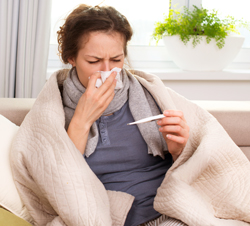Does Your Air Conditioner Have Mold?
One of the core causes of mold is high humidity levels. For this reason, your air conditioner is effective at reducing humidity levels and maintaining healthy levels of 30% to 50%. Unfortunately, your air conditioner can also be a source of mold if it is not properly maintained. The purpose of this article is to explain how your air conditioner could be a source of mold contamination and what you can do to address this problem.
The HVAC System Is Your Home’s Lungs
HVAC is an abbreviation for Heating, Ventilation, and Air Conditioning. The purpose of the HVAC system is to provide healthy indoor air quality by removing moisture, odors, smoke, heat, dust, airborne bacteria, and carbon dioxide, and replace it with clean air.
Ventilation is the most important component of your HVAC system because it’s main purpose is to circulate the air within the home and ideally is constantly introducing outside air into the system. The duct work in the HVAC system enables it to circulate the air throughout the whole home. Proper maintenance of your HVAC system is essential to ensuring that your indoor air quality is optimal.
Failure to replace filters is the number one error that home owners make. Filters need to be replaced consistently because they prevent pollen, pesticides, and other pollutants from entering the home. Once pollutants, dust, and other debris get into the duct work, mold can begin to grow because it now has a food source. Mold will only begin to grow if there is moisture. Once mold spores enter the air conditioning system, alternating high and low humidity conditions will help grow, spread, and distribute the spores throughout the house.
Illnesses Caused By Air Conditioning Mold
Health signs that you could have mold in your AC unit include the following:
- Frequent colds
- Stomach pains
- Ear infections
- Frequent headaches
- Allergic reactions
- Asthma
- Coughing
- Sneezing
- Wheezing
- Itchy skin
- Sore nasal passages
- Irritated throat
- Watery eyes/dry eyes
- Hypersensitivity
- Skin care problems
Many of these symptoms are also associated with over-exposure to air conditioning which causes mucus membranes to dry out, causing colds, upper respiratory infections, dry skin, nose bleeds, and flu-like symptoms including fatigue, headaches, dizziness, and breathing difficulties.
Another potential problem caused by over-exposure to air conditioning is heat intolerance which causes discomfort when you go outside. Symptoms of heat intolerance include exhaustion, dizziness, headaches, and heat stroke. Prevent over-exposure by using a thermostat that regulates the indoor temperature, meaning the AC unit turns off when the ideal temperature is reached and turns on when the temperature goes above the ideal setting.
How Do I Verify That I Have Air Conditioning Mold?
If you are experiencing the health symptoms above and suspect that your AC unit or duct work is contaminated with mold, here are some clues to determine if you do have mold.
1. Check your vents and look for any visible mold or a musty smell in the room.
2. Take a short vacation and record your health symptoms. If you feel better when you are out of your home, then likely you have air quality concerns in your home which could be caused by mold.
3. Hire a professional mold inspector to do a complete survey of the home to find the source of contamination and determine if the home requires remediation. Also, be sure to check your crawlspace for suspect mold.
If no suspect mold is found or major moisture concerns that could be causing the mold, then a comparative air quality test can measure the relative spore count inside and outside. If the spore count is much higher inside than outside, then this could indicate that you have mold spores circulating throughout your home and you should get your AC unit and ducts checked for mold.
Removing Air Conditioning Mold
If you have mold in your AC unit, then it should be professionally cleaned. When you hire the service company, ensure that they take the following actions:
- Clean the blower unit.
- Use a certified and non-toxic chemical cleaner.
- Use a chemical that has anti-fungi and anti-bacterial properties.
- Ensure that the technician does not just clean the unit with a vacuum and brush because this simply agitates the bacteria and viruses breeding there.
We also recommend that the ducts are professionally cleaned in accordance with NADCA standards to ensure that your whole HVAC system is functioning efficiently and to prevent further spread of mold spores.
Professionals should be hired because it can be difficult to access all the parts of the air conditioning ductwork and they have the experience and training to do this properly. Further, professionals have air whips or air skippers that drive dust, dirt, mold, and other debris toward collection devices fitted with HEPA (high-efficiency particulate air) filters.
Preventing Air Conditioning Mold
Mold can be prevented in your air conditioner and HVAC system. Once you have the system professionally serviced and cleaned, these guidelines will help prevent future problems
1. Always maintain indoor humidity levels between 30% and 50% by getting a humidistat installed and set at the ideal level.
2. Follow manufacturer’s recommendations and clean or replace your unit’s air filter because these are designed to prevent the spread of bacteria and viruses. Failure to properly clean and replace filters will allow pollutants to build up and get caught in the filter and disperse into your indoor air.
3. Service your HVAC system every year.
4. Turn off your system and open the windows during cooler periods to bring in more fresh air. Adequate ventilation is essential to reducing indoor contaminants.
5. Install an air cleaner on your central heating and air conditioner unit to ensure a constant stream of clean air.
Consistent use of your AC is important because it reduces humidity levels which is moisture that mold needs to thrive. However, like any household appliance, you need to properly service and maintain your AC unit to ensure that it is operating efficiently and does not become a source of indoor contamination. Preventative maintenance is the key.
If you are having questions related to Mold Remediation in Atlanta We are here to help. Call (470) 545-4467, or contact us via e-mail.
Is Your Air Conditioner Making You Sick?: The purpose of this article is to explain how you air conditioner could be a source of #mold contamination making you sick and what you can do to fix the problem.
Posted by Mold-B-Gone Remediation, LLC on Sunday, August 23, 2015
Is Your Air Conditioner Making You Sick From #Mold? PLS RT http://t.co/kPF476PTeN pic.twitter.com/kpGS35WFXr
— Mold B Gone (@moldbgonega) August 23, 2015

